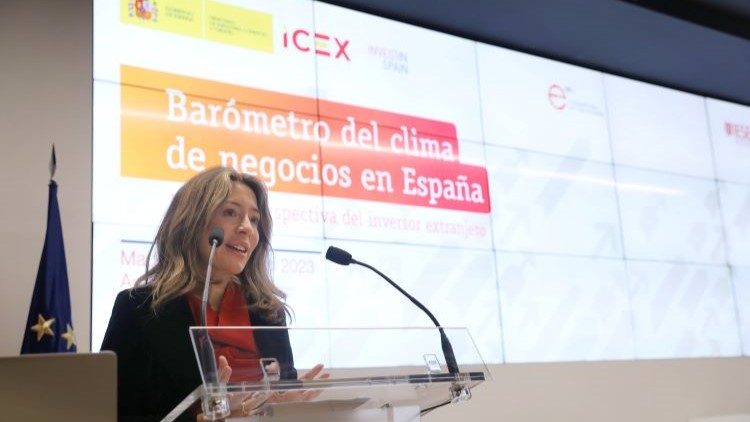The Diplomat
The vast majority of companies with foreign capital in Spain plan to increase or, at least, maintain their investments in our country in 2023, despite the uncertainty of the international economic and political situation.
This is one of the conclusions of the Barometer of the business climate in Spain from the perspective of foreign investors, carried out jointly by ICEX-Invest in Spain, Multinationals by Brand Spain and IESE’s International Center for Competitiveness, which gathers the assessment and importance given by more than 720 companies with foreign capital to the business climate in Spain.
“Spain is in a more favorable economic dynamic than that experienced by the countries in our immediate environment,” said the State Secretary for Trade, Xiana Méndez, during the presentation of the report, which took place yesterday at the ICEX Auditorium in Madrid and in which also participated the executive director of ICEX-Invest in Spain, Elisa García Grande; the president of Multinationals for Marca España, Álvaro Álvarez; the director of Corporate Development at IESE, Natalia Centenera, and the associate researcher at the International Center for Competitiveness- IESE Business School, María Luisa Blázquez.
“The foreign sector is being decisive in this positive evolution, as Spanish companies are exporting more than ever, with record highs,” Méndez continued. “In addition, foreign investments have provided us with excellent news in 2022 on a quantitative and qualitative level, with a growth from January to September of nearly 55% compared to the same period last year,” she added.
According to the Barometer, investing companies generally confirmed a very favorable performance in 2021, although closing figures for 2022 and forecasts for 2023, although positive, are affected by the uncertainty of the international economic and political situation. Apart from this, the estimates for 2023 in the investment and export trends of these companies are significantly maintained, although the number of companies that think they will grow in turnover and employment is slightly reduced. Thus, 84% of the companies surveyed increased or maintained their investments in 2022, compared to 88% in 2021. By 2023, 84% of the companies plan to increase or maintain their investments.
The turnover prospects in our country are the most reflective of the current complicated economic situation and future uncertainty, according to the Barometer. In 2022, 83% of companies increased or maintained their turnover in Spain, compared to 82% in 2021. However, in 2023, 20% of companies expect to see a reduction in their turnover, and the percentage of those expecting to increase it falls from 59% in 2022 to 49% in 2023.
In terms of job creation, the employment levels of foreign companies established in Spain improved in 2022 compared to the previous year. Thus, 91% of the companies increased or maintained their workforces, and only 9% reduced them, compared to 2021, when 12% of the companies said they had reduced them. Likewise, forecasts remain positive for the year ahead, although the percentage of companies planning to increase their workforce has fallen from 47% in 2022 to 36% in 2023.
Finally, with regard to export volume, 70% of the foreign companies surveyed export to third markets from Spain. The outlook is positive, although slightly lower than in 2021. In that year, only 8% of companies decreased their exports, a percentage that will increase to 10% in both 2022 and 2023.
Infrastructure, market size and human capital
The areas most highly rated by foreign investors were those related to infrastructure – specifically airports, roads, telecommunications structures and services, ports and the high-speed train – followed by market size and human capital, where they valued the availability of skilled labor, with university degrees, and their ability to learn. Once again this year, these areas also coincide with those that receive the greatest importance when it comes to investing in a foreign country on the part of those surveyed. Among the least valued areas are, in this edition, the cost of electricity and other energies such as gas, diesel or gasoline, and transportation. Other weaknesses refer to aspects of the regulatory environment, such as the speed and efficiency of the commercial courts and bureaucracy.
In this edition, two questions have been included on the impact that the Russian invasion of Ukraine is having on companies’ results. In this sense, the Barometer shows that this has been high or very high for 50% of the companies and only 7% consider that the conflict has had a low impact on their activity. With regard to the influence of the war crisis on company management, the impact on energy costs stands out, mentioned by 88% of the companies. 56% of the companies also consider that the war has had important consequences on the lack of supplies and that it has generated problems in logistics distribution, according to 41% of the managers consulted.







